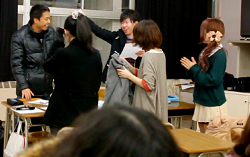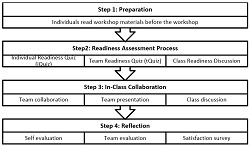When considering the positive results of Team Hachi Project, a collaborative action research project to assess the viability of team learning with remedial students in a lecture-based Japanese university, researchers considered if the Hawthorne Effect was more responsible for improvements than the team learning process they had introduced. This introduced a question about whether the results represented substantive or superficial improvements in student performance and satisfaction (Duncan, 2013). Reviewing assessment, survey, video, and interview data collected during the research cycles illuminated the Hawthorne Effect as a useful tool that teachers can leverage to influence substantial improvements in student and classroom, especially when integrated with scaffolding techniques suggested in Lev Vygotskiǐ’s (1978) theory of cognitive development and situational leadership approaches proposed in Gerald Grow’s (1996) self-directed learning model.
This paper is adapted from:
Duncan, B. (2013). Assessing the viability of team learning with remedial students in a lecture-based Japanese higher education culture. Ann Arbor, MI: ProQuest LLC, Fielding Graduate University. Retrieved from https://search.proquest.com/docview/1352039981
This paper was published in the December 2018 issue of Kyiv International University Higher Education Journal
https://kymu.edu.ua/upload/pdf_files/small-group_learning_research.pdf
(C) 2022 by Brent Duncan, PhD. All rights reserved. Contact Dr. Duncan using the Contact Us form at Synthegrate.com.




